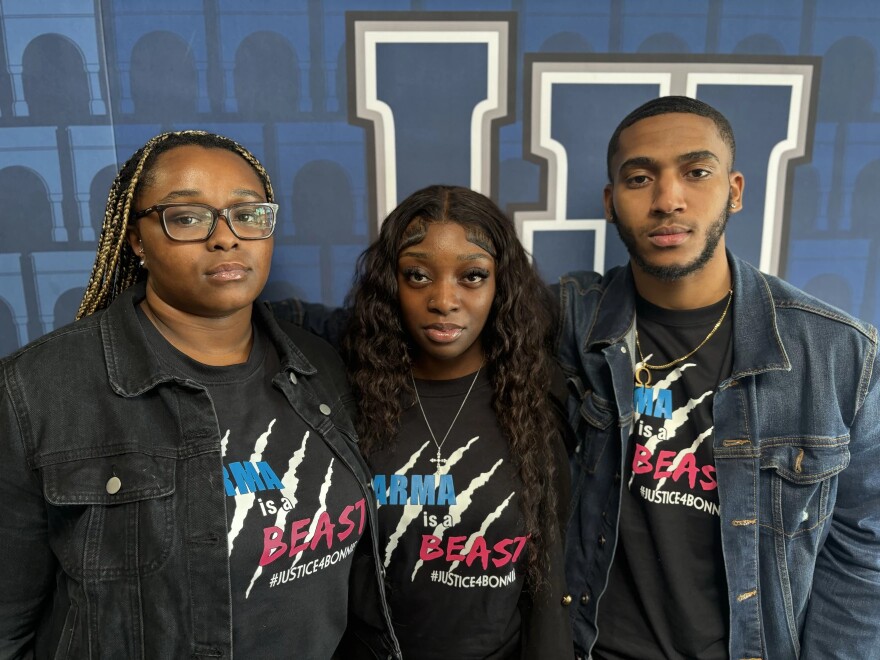This is a developing story and it will be updated.
Describing a “robust, weeks-long independent review,” Lincoln University leaders said Thursday there was no evidence of bullying on the part of university President John Moseley. The Lincoln Board of Curators has voted to bring Moseley back from his leave of absence.
The university hired a St. Louis law firm to conduct the review after the university’s vice president of student affairs took her own life in January. Antoinette “Bonnie” Candia-Bailey wrote a highly critical email to Lincoln University's president before she died.
Running more than ten pages and nearly 6,000 words, the email called out Moseley for a litany of actions that Candia-Bailey said exacerbated her existing mental health condition, which she did not explicitly describe.
Rod Chapel, president of the Missouri NAACP State Conference, is quoted in a press release from the Lincoln Board of Curators:
“This third-party investigation was independent and thorough, and members of the Board and I are confident in its conclusions that no claims of bullying by the University President can be substantiated, and the University responded appropriately to requests for accommodation.”
In the press release, Chapel is referred to as “serving as special counsel to the Board of Curators.”
In her email, which the Midwest Newsroom first reviewed in January, Candia-Bailey gives Moseley 18 recommendations for how to improve his job performance as university president. She includes accusations of micromanagement, failure to provide clear directions, inconsistency and arrogance.
Bailey’s death on Jan. 8 roiled the Jefferson City campus and its wide network of alumni. Within days, Moseley took a paid leave of absence and the Lincoln Board of Curators announced the review.
As word of Candia-Bailey’s death and her email spread, blame and criticism grew among alumni and students–most of it directed at Moseley, who fired Candia-Bailey the week before she died.
Her termination letter read, in part, that she “was being fired ‘due to your continued failure to appropriately supervise your staff and continued failure to properly supervise the area of student affairs at Lincoln University.’”
Candia-Bailey’s email addresses her firing, admitting to mistakes and detailing the times she tried to work within the university’s processes and seek ways to improve.
At a Board of Curators meeting in February, Lincoln students held up pictures of Candia-Bailey as student government leaders sat before the board to present their demands and questions.

Student government president Kenlyn Washington said Candia-Bailey's email drew attention to concerns that students have been raising for years.
“We need something to happen, we’ve been saying this constantly for years and years, and like I said, she gave us this light, but it’s been so — it took her light, but we should have been talking about this a long time ago,” Washington said.
Antonio Lewis, president of the Atlanta chapter of the Lincoln University Alumni Association, was among dozens of people who received Candia-Bailey’s email.
“It was a manifesto,” Lewis told the Midwest Newsroom in January. “She was very direct with what she wanted to happen and what had happened to her. I think the entire email shows the culture of bullying and go-along-to-get-along, and it is sickening.”
In an apparent nod to student and alumni concerns, the Lincoln Board of Curators President Victor Pasley is quoted in the press release stating that “this report is not the end of a process, but rather the beginning of one.”
“None of its findings have led the Board to doubt President Moseley’s ability to lead the University, but this tragedy has forced us to grapple more fully with issues facing Lincoln and our individual students and employees – ranging from mental health support to employee work and relationships,” Pasley said.
Lincoln University is promising expanded mental and behavioral health support for employees and students, and increased training for University leadership.
“I’ve had time to reflect and to discuss my future and that of the University with my family and members of the Lincoln University community,” Moseley states in the press release. “I care deeply for this University, its mission, our students, staff and faculty and I look forward to returning from administrative leave to resume my duties as President.”
Chapel is further quoted in the press release:
“While this independent report clarifies the facts about legal and procedural concerns that have been raised, it does not make Dr. Candia-Bailey’s death any less tragic for her loved ones or our University community and we continue to grieve her loss as we work with students and employees to strengthen Lincoln University moving forward.”
Lincoln University, one of two Historically Black Colleges and Universities (HBCUs) in Missouri, has struggled with funding shortfalls and declining enrollment. In late 2023, federal officials estimated Missouri had underfunded the college, located in Jefferson City, by almost $361.6 million for three decades.
The Missouri Independent reported that Lincoln University’s funding woes grew “over years of the state not meeting its obligation to match federal funds and school administrators dipping into the university’s other revenue streams.”
Moseley’s university biography touts the securing of the much-needed funding: “For the first time since it was federally mandated in 2000, the University received nearly $10 million, the full state match for its federal land grant funding, in May 2022 and maintained the full funding following the 2023 legislative session.”
This story comes from the Midwest Newsroom, an investigative journalism collaboration including IPR, KCUR 89.3, Nebraska Public Media News, St. Louis Public Radio and NPR.
Copyright 2024 KCUR 89.3. To see more, visit KCUR 89.3. 9(MDAxODQ2NTcwMDEyMTczNTUzNDMzODFkZQ004))


